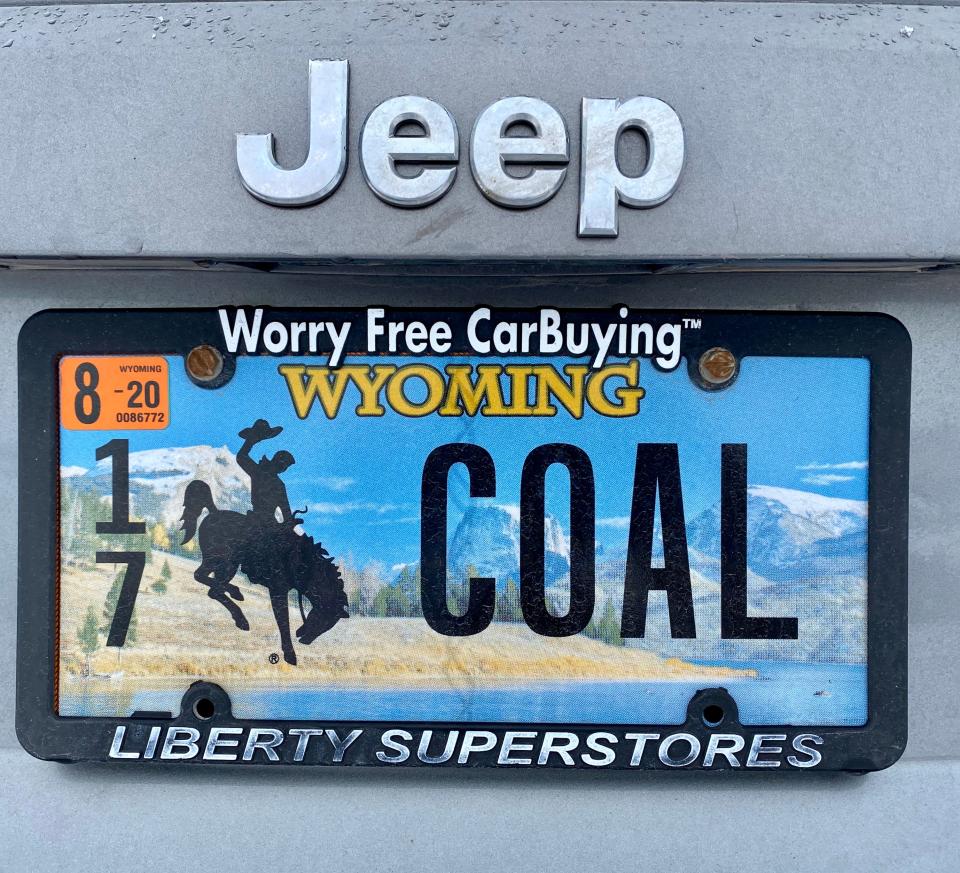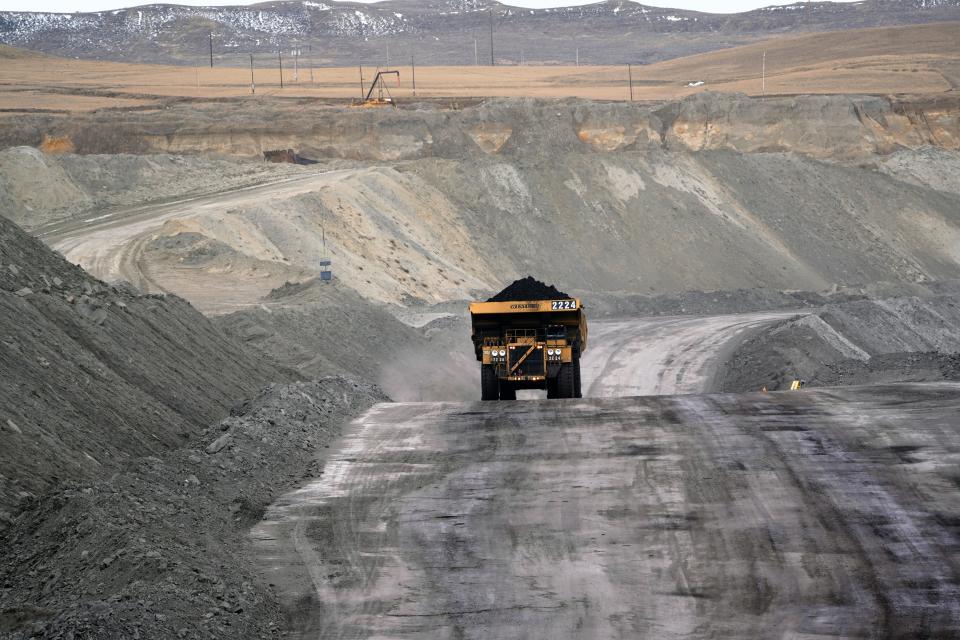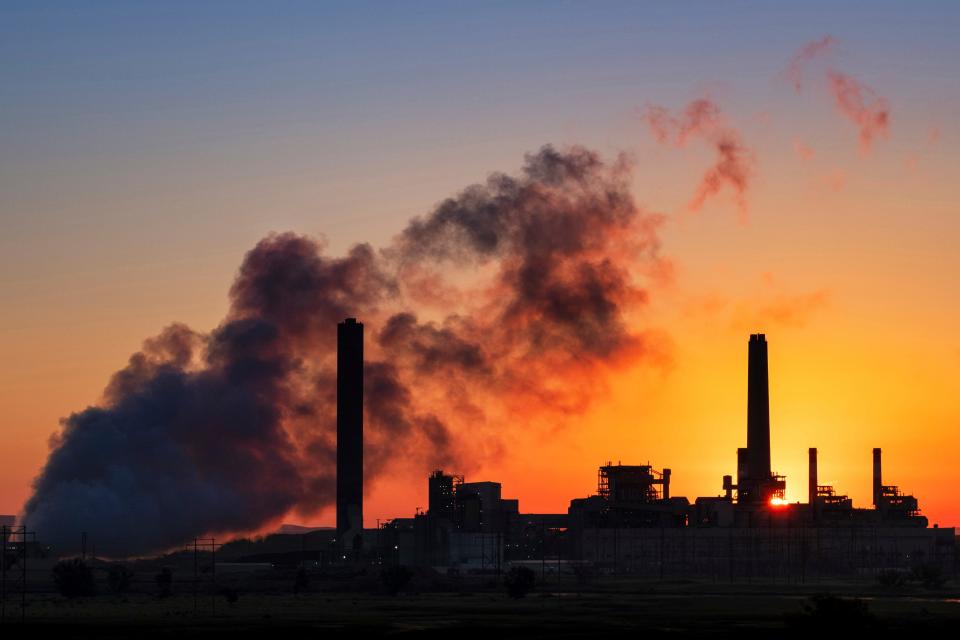Bill Gates, Warren Buffett want to bring a new kind of nuclear power to Wyoming. Not everyone is happy about it.
- Oops!Something went wrong.Please try again later.
Tim Kaumo grew up in the shadow of Wyoming's imposing Jim Bridger Power Plant, with its four towering exhaust stacks and rumbling trains delivering a steady stream of coal feeding the hungry boilers converting carbon into electricity.
Where some people see a massive monument to a climate changed by the burning of fossil fuels, Kaumo, 55, sees jobs. A stable community. Low tax rates. Good schools.
In Wyoming, support for coal runs as deep and as wide as the jet-black seams of carbon ripped from the ground in massive open-pit mines, even as much of the rest of the industrialized world increasingly phases out the use of fossil fuels to reduce the harm of climate change that’s powering severe weather across the United States and globally.
"You can't forget about coal and the important role that those jobs and those families play in this community," said Kaumo, the mayor of Rock Springs, the closest town to the Bridger power plant. "Jim Bridger has always been that strong icon, that foundation built on Wyoming coal."
But that foundation is faltering as the nation shifts away from coal.
Now, billionaires Warren Buffett and Bill Gates are proposing to build a new kind of small nuclear power plant in rural Wyoming. Designed to be easier to build and operate than a traditional nuclear power plant, the so-called "Natrium" reactor would replace a portion of an existing coal-fired power plant.
With the promise of thousands of temporary construction jobs and hundreds of high-paying nuclear-plant operations jobs at a time when coal mine and coal power jobs are vanishing, the Gates-Buffett reactor plant has secured both federal funding and support from Wyoming's political leaders. But it also faces opposition from both environmental groups and some of the state's ultraconservatives who are skeptical of the motivation behind it: fighting climate change.

A new nuclear technology
Although it's the nation's least-populous state, Wyoming is one of the nation's biggest power producers thanks to massive coal deposits lying close to the surface. Diggers claw the coal from the ground and load it onto trains where it's delivered to power plants that burn it to make steam, which turns turbines to make electricity.
The proposed Natrium nuclear plant driven by Gates’ company TerraPower would use radioactive uranium to heat up liquid sodium metal – natrium is an old word for sodium – and then the liquid metal heats water to make steam to power a turbine. Liquid sodium allows the plant to operate at lower pressures than traditional nuclear power plants, in theory making it less likely to suffer a meltdown like what happened at the Chernobyl nuclear power plant in the Soviet Union in 1986 or the Three Mile Island Nuclear Generating Station in Pennsylvania in 1979.
Bridger is one of the four potential sites in Wyoming for the Natrium plant, and Kaumo is lobbying heavily to win the $4 billion project. Buffett and Gates envision it as the first of seven small nuclear power plants across Wyoming, ultimately replacing much of the state's coal-fired plants.
"Here in Wyoming, you'll never convince me that coal isn't the most reliable source of energy," Kaumo said. "But I think we need to start thinking outside the box."
The 345-megawatt Natrium plant would produce enough power for roughly 250,000 homes, a far cry from the more than 2,400 megawatts produced by Bridger's four coal boilers, which are scheduled to close by 2037.
By storing the reactor's excess heat in molten salt, the proposed nuclear plant could provide about five hours of extra capacity to serve peak loads, much like a battery.
Although similar reactor systems have been built before, including in U.S. Navy submarines, the Natrium project is considered to be a test by the federal government, which is footing up to half of the price tag.
Federal officials, including Secretary of Energy Jennifer Granholm, see small nuclear power plants as a solution to climate change because they don't contribute to carbon emissions.
Because the Natrium plant is smaller and uses modern technology, its backers say it could be built faster and cheaper than a traditional large-scale nuclear power plant. A large part of the savings comes from an 80% reduction in the use of expensive nuclear-shielding concrete, making the plant significantly smaller.

The proposal by Buffett and Gates has backing and funding from President Joe Biden's administration, and political support from Wyoming's top leaders, including Gov. Mark Gordon, a Republican. Backers argue nuclear power is a reliable, safe source of baseline electricity that works regardless if the wind is blowing or the sun is shining.
Jeff Navin, director of external affairs for TerraPower, said the company chose Wyoming in large part because it is already known as a big power producer, with a workforce able to help build and operate the plant. No state money would be used to build the reactor, which is estimated to cost about $4 billion, split equally between TerraPower and the federal government.
TerraPower officials who announced the project last month said they’ve already begun meeting with and listening to Wyoming residents to better understand their concerns and hopes. The project could bring up to 3,000 temporary construction-related jobs and up to 200 high-paying permanent operations jobs, Navin said.
But the proposal faces deep skepticism from local environmentalists, rank-and-file conservatives and some coal miners, with concerns ranging from the disposal of nuclear waste to the motivations of Gates and Buffett, two ultrarich men with liberal reputations, at least compared with the fiercely Republican state, where nearly 70% of voters backed then-President Donald Trump in the 2020 election.
The Wyoming reactor would replace a portion of one of four coal-fired power plants owned by a subsidiary of Buffett's Berkshire Hathaway company, using technology developed via Gates' funding, with assistance from the federal government. Buffett's coal plants in Wyoming are scheduled for a shutdown over the coming decades as his company invests in wind and solar electricity to reduce heat-trapping carbon dioxide gas emissions, as demanded by investors and federal regulators.
The four sites are the Bridger plant, the Wyodak plant near Gillette, the Naughton plant near Kemmerer in southwestern Wyoming, and the Dave Johnston Power Plant near Glenrock in east-central Wyoming.
Today, coal and nuclear power plants across the country each generate about 20% of the nation's electricity, with renewables making up another 20%, and natural gas the remaining 40%. Wyoming is the nation's leading producer of coal, virtually all of which is burned to make electricity serving residents of other states, mainly Oregon, California, Colorado and Washington.

The amount of coal being mined and burned in Wyoming has been dropping for a decade, accompanied by significant losses of high-paying jobs that don't require a college degree. Wyoming's taxpayers have been funding lawsuits and lobbying to keep coal-fired power plants open, even in other states. Last month, Wyoming lost a lawsuit against Washington state for trying to block a coal-export terminal on the coast, which would have allowed Wyoming coal to be shipped overseas.
Gordon, the governor, sees the nuclear plant as a win in every direction: Wyoming has large uranium reserves and idled mines that could provide the raw fuel, reducing dependence on foreign companies. Coal-plant workers could be retrained to run the nuclear station. And Wyoming would retain its status as a top energy producer while serving as a model for other states.
"As the No. 1 producer of uranium in the country, seeing a project stood up, which could revitalize an important segment of our economy and provide good-paying jobs and careers, is welcome," Gordon told USA TODAY. "If it meets all appropriate safeguards, doesn’t accept our nation’s nuclear waste, and stands on its own without state subsidy, I think it will pass muster."
Some on left and right oppose nuclear project
Wyoming's small cadre of environmental activists oppose the project. Connie Wilbert, who runs the Sierra Club in Wyoming, said she's worried the state is once again seeking a big-swing solution to the dwindling importance of coal. The Sierra Club opposes all nuclear power plants because of the radioactive waste they produce, but Wilbert said the waste was just one issue with the Natrium proposal.
"This isn't a solution. It's a distraction," she said. "It looks like an easy solution because it has parameters we're familiar with. Change is hard and uncomfortable. So what is comfortable and easy for Wyoming is another variation of the same old model."

Wilbert, 67, said Wyoming was rapidly becoming a major player in the wind-and-solar generating field – climate change solutions that are well-tested, well-understood and already being deployed. She said pursuing an experimental nuclear power plant makes little sense, especially as battery technology is rapidly making electric cars more effective at storing excess electricity generated when it's windy or sunny.
"There are so many small answers like that," she said. "And we need all of those small answers. Because no one thing is going to replace coal. And that's what we need to be pursuing, not chasing these dreams of nuclear energy saving our bacon. I have not talked to one single person who thinks this is a solution for us. They just see it as a distraction, and a distraction that's wasting resources and time we don't have to waste."
Former coal miner Lynne Huskinson is skeptical. While she worries about the fate of coal workers, Huskinson is also concerned about who backs the project. Gates' net worth is roughly $127 billion, while Buffett is worth an estimated $101 billion. In comparison, Wyoming had an annual GDP of $36.4 billion last year.
Huskinson, 60, started working at a coal mine in Gillette when she was 19 but got laid off in 2019 after 39 years, losing her retirement and health savings account when the company declared bankruptcy unexpectedly. The multimillionaire former CEO of her mining faces multiple lawsuits that he cheated workers out of their pay.
Huskinson said her experience with the Blackjewel mining company taught her to be skeptical of corporations and the ultra-wealthy.
"They come from privilege and they don't think about the people at the bottom," Huskinson said of Gates and Buffett. "A nuclear reactor isn't to help workers. It's something they can do because they're filthy rich."
It's not just the money that worries some Wyoming residents.
Gates is the largest owner of agricultural land in the United States, and Wyoming residents, many of whom are connected to the cattle industry, worry he's planning to use that influence to change or reduce cattle ranching, which environmentalists blame for producing significant amounts of carbon dioxide and methane. Gates also recently bought "Buffalo" Bill Cody's former ranch near Cody, Wyoming.
"Not a lot of people in Wyoming are comfortable with the idea that he's the largest agricultural landowner in the United States," said Joey Correnti IV, chairman of the Carbon County Republican Party. "The biggest concerns are about the people who are involved -- the Warren Buffett thing, the Bill Gates thing. A lot of Wyoming Republicans don't like the idea of these people coming in.”
Carbon County, in south-central Wyoming, is named for the coal extracted from the Powder River Basin. Correnti, 41, served in the U.S. Army and said he’s familiar with the safe use of nuclear power, and has no philosophical objection to it being used in Wyoming. The issue, he said, is unproven technology being pushed by two men who he and some other residents believe have an ulterior motive.
"A lot of people, we’re not opposed to nuclear and we want to know more specifics,” Correnti said. “If Warren Buffett and Bill Gates want to bring in nuclear and shut down coal, and they have enough money to get the politicians to support that, we're definitely going to have a problem with that."

Shannon Anderson, a staff attorney with the Powder River Basin Resource Council, said coal fits neatly into Wyoming’s self-identity as a go-it-alone kind of place, and nuclear perpetuates it. The nonprofit council works with coal-mining communities to protect the air and water from pollution, and lobbies to make sure mining companies meet their legal obligations to repair the damage they cause.
Anderson, 41, said she’s surprised the nuclear plant proposal has won as much political backing as it has, given the participation of Gates and Buffett.
"There is a Wyoming ethic and ethos about doing things on our own, and a distrust of out-of-state billionaires,” she said.
Backers seek community support
Navin, the TerraPower executive, said the company understands Wyoming residents are skeptical of the proposal.

Although nuclear power is a key generator of electricity nationally, the fact that the industry usually “keeps our heads down and puts a whole bunch of clean electrons onto the grid, in some ways, that has not been to our advantage,” Navin said. “One of our lessons has been to talk about it, engage with the people who are going to live around the reactor.”
TerraPower wants to be welcomed, he said, and the fact the mayors of all four sites support the project has been heartening.
“There are many people in Wyoming, just like there are many people in West Virginia, who recognize that the state economy has to be diversified. You cannot rely on one source for all of your economy, and you can’t rely on one source for all your energy,” he said. “For those communities who are facing coal plant closures, we see nothing but enthusiastic support.”
In the self-proclaimed "Energy Capital of the Nation," Gillette Mayor Louise Carter-King said she’s heard similar complaints about the participation of Gates and Buffett, but hopes Wyoming residents can set aside their skepticism.
"There have been some concerns, but it's not really about the danger side," Carter-King said. "It's more people saying you don't want to do anything that Biden wants, that Bill Gates wants.”
Carter-King, who hopes the nuclear plant is built near her city, said the benefits of the project for Wyoming outweigh the concerns of who backs the project. She said it’s more important the Cowboy State maintain its status as an energy producer.
“Wind and solar are all fine, but you need something that's sustainable,” she said. “I would never say we're done with coal, because we're not. But we have to do whatever it takes to keep our economy moving forward. If nuclear is part of that equation, so be it."
Travis Deti, executive director of the Wyoming Mining Association, said his members – both coal and uranium miners – see the benefits of the project. He dismissed the criticism from keyboard warriors critical of Gates, laughing at the idea that they are likely typing out their skepticism on a Windows-based computer, which he said is a demonstration of how successful Gates has been.

"What we're looking at is the future, the future opportunities,” he said. "There are a lot of hurdles they have to overcome. But we see this as getting the United States back on the nuclear playing field. We still believe that in Wyoming we can walk and chew gum at the same time."
Wyoming Sen. John Barrasso, a Republican, has long championed greater nuclear power generation and helped write the legislation enabling the project. He dismissed criticism of Gates' and Buffett's politics, arguing that pursuing an “all of the above” energy policy helps keep the United States secure. He said the project is even more important given that Biden has “put a target” on the oil and gas industry by halting new permits.
"Nuclear power is the only power to scale, the No. 1 zero-carbon source of power,” he said. “What better place than Wyoming?"
Huskinson, the former coal miner, isn’t so sure. Spurred to join the environmental movement by the changes she's seen around her – from wildfires to droughts – worsened by the burning of coal she once blasted and clawed from the Earth, Huskinson said making more nuclear waste via an unproven reactor makes little sense.
"It just seems like a huge Band-Aid or a distraction,” she said. "Why are they making a deal with the devil?"
This article originally appeared on USA TODAY: Bill Gates, Warren Buffett propose nuclear power plant in Wyoming
